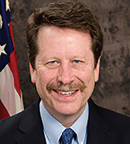Recently, the U.S. Food and Drug Administration (FDA) issued a new draft guidance to industry for developing plans to enroll more participants from underrepresented racial and ethnic populations in the United States into clinical trials—expanding on the agency’s previous guidances for industry to improve clinical trial diversity.
This draft guidance, “Diversity Plans to Improve Enrollment of Participants from Underrepresented Racial and Ethnic Subgroups in Clinical Trials,” recommends that sponsors of medical products develop and submit a Race and Ethnicity Diversity Plan to the agency early in clinical development, based on a framework outlined in the guidance.

Robert M. Califf, MD
“The U.S. population has become increasingly diverse, and ensuring meaningful representation of racial and ethnic minorities in clinical trials for regulated medical products is fundamental to public health,” said FDA Commissioner Robert M. Califf, MD. “Going forward, achieving greater diversity will be a key focus throughout the FDA to facilitate the development of better treatments and better ways to fight diseases that often disproportionately impact diverse communities. This guidance also further demonstrates how we support the [Biden] Administration’s Cancer Moonshot goal of addressing inequities in cancer care, helping to ensure that every community in America has access to cutting-edge cancer diagnostics, therapeutics, and clinical trials.”
Clinical Trial Underrepresentation
Despite having a disproportionate burden for certain diseases, racial and ethnic minorities are frequently underrepresented in biomedical research. Clinical trials provide a crucial base of evidence for evaluating whether a medical product is safe and effective; therefore, enrollment in clinical trials should reflect the diversity of the population that is ultimately going to use the treatment, especially given that biologic differences exist in how people respond to certain therapies.
Barriers to participation among racial and ethnic groups may include mistrust of the clinical research system due to historical abuses, aspects of the trial design such as inadequate recruitment and retention efforts, frequency of study visits, time and resource constraints for participants, transportation challenges, and participation conflicting with caregiver or family responsibilities. In addition, language and cultural differences, health literacy, religion, limited access within the health-care system, and a lack of awareness and knowledge about what a clinical trial is and what it means to participate may impact clinical trial participation among racial and ethnic minority populations.
The FDA remains committed to increasing enrollment of diverse populations in medical product and drug development and will continue to engage with federal partners, medical product manufacturers, health-care professionals, and health advocates to reach this goal.
Collaborative Effort
To support the FDA’s efforts to advance diverse participation, the Office of Minority Health and Health Equity created the “Diversity in Clinical Trials Initiative,” which includes an ongoing public education and outreach campaign to help address some of the barriers preventing diverse groups from participating in clinical trials. Barriers to participation are addressed through a variety of culturally and linguistically tailored strategies, tools, and resources such as educational materials in multiple languages, a dedicated Web page with public service announcements and videos, social media outreach and ongoing stakeholder engagement, collaborations, and partnerships.
In February, the Biden Administration revived the Cancer Moonshot initiative to further expand cancer prevention, detection, research, and patient care efforts across the federal government. The FDA Commissioner serves as a member of the White House Cancer Cabinet, comprising departmental agencies and components organized to develop a unified strategy in the fight against the disease. One of the goals of the Cancer Moonshot is to address inequities in access to cancer screening, diagnostics, and treatment across race, gender, region, and resources. The FDA’s guidances on increasing diversity in clinical trials are aligned with the Cancer Moonshot goals.
The draft guidance was developed by the Oncology Center of Excellence’s Project Equity, which aims to ensure that the data submitted to the FDA for approval of oncology medical products adequately reflects the demographic representation of participants for whom the medical products are intended. As this guidance applies to all medical products, the Center for Drug Evaluation and Research, the Center for Biologics Evaluation and Research, and the Center for Devices and Radiological Health also contributed to this collaborative effort.

